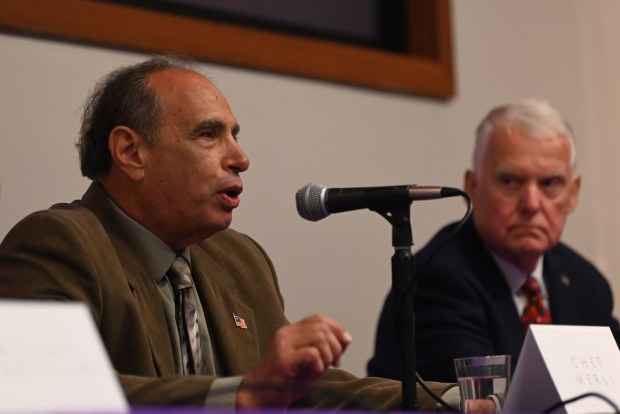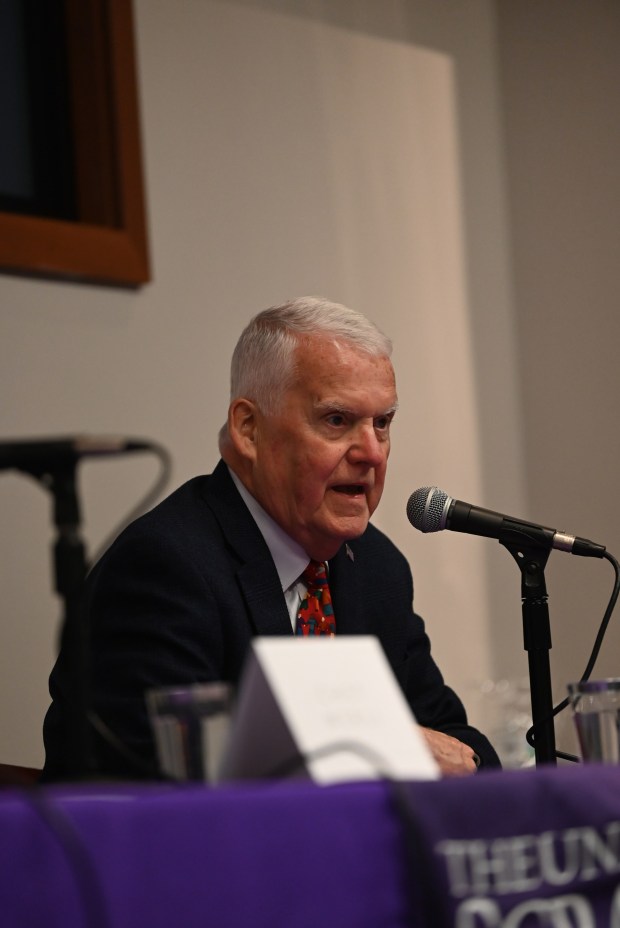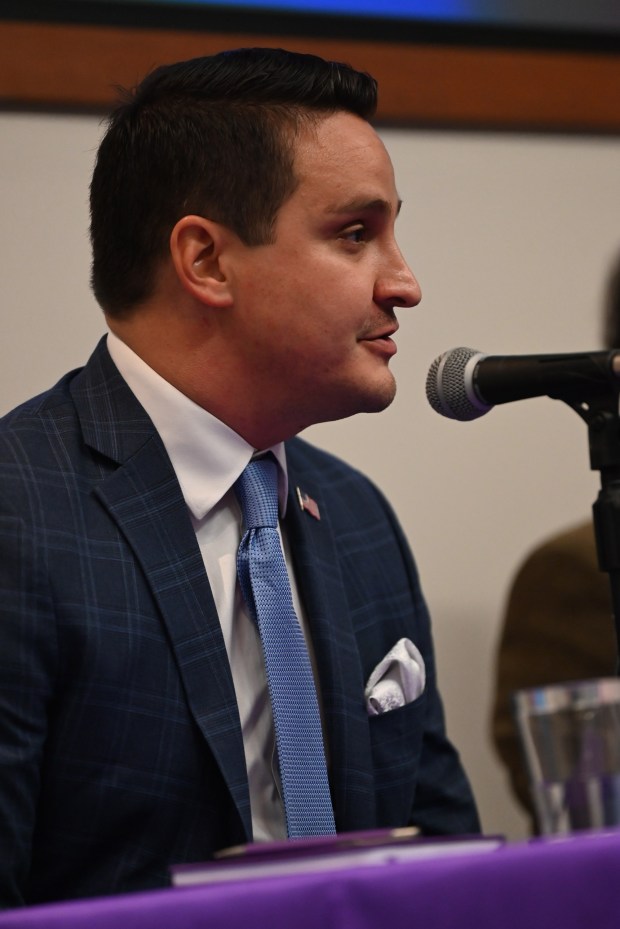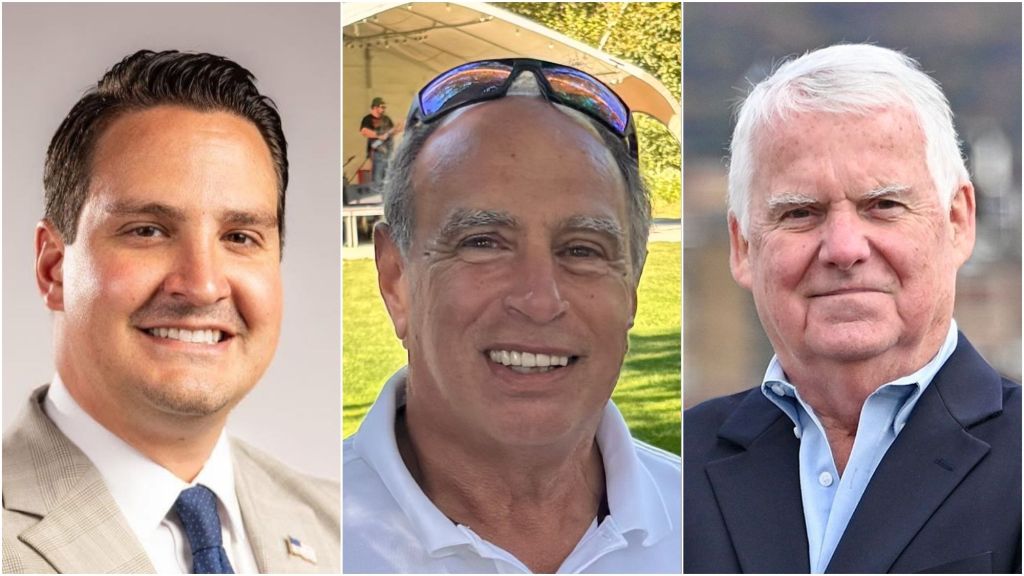All three candidates in a Nov. 4 special election for Lackawanna County commissioner hope to help lead a government still grappling with the fallout from two long-term failures — the decadeslong failure to update countywide property assessments and the more recent failure to maintain financial stability.
But they’d also join a county government that’s recently made considerable progress on both fronts, albeit not without some pain along the way.
The county is on the cusp of completing its first comprehensive property reassessment since 1968 even as some candidates, officials and property owners raise concern about the results of the ever-politically-unpopular process last accomplished here before man walked on the moon. And it’s poised to enter 2026 on much more stable fiscal footing following the tough medicine of a nearly 33% 2025 tax hike the Democratic majority commissioners begrudgingly approved last year to address a structural deficit problem exacerbated by years of stagnant revenues, escalating expenses and the use of one-time revenue sources to balance budgets.
The special election contest between Democrat Thom Welby of Scranton, Republican Chet Merli of Blakely and independent candidate Michael Cappellini of Jessup — all of whom are vying to fill the remainder of former Democratic Commissioner Matt McGloin’s unexpired term running into early January 2028 — is taking place against that backdrop. The context of the race is also colored by months of bitter fighting in and out of court over the seat McGloin resigned in late February and that appointed Democratic Commissioner Brenda Sacco finally filled Wednesday.
The former county economic development director accepted an appointment to the commissioner position she’ll ostensibly hold for just a matter of weeks, until she’s replaced by the special election winner. But Sacco complicated that expectation last week by publicly expressing hope that she’ll hold the office until McGloin’s term expires, foreshadowing a potential future legal battle over the commissioner seat’s rightful occupant.
Welby, 76, a former Democratic state representative, Merli, 71, a Lackawanna County Regional Planning Commission board member, and Cappellini, 36, a cigar brand ambassador who switched from a Democrat to an independent to seek the seat, all expect to hold it for the next two-plus years if they win the special election.
Here’s where they stand on some key issues:
Reassessment
For years the political debate over reassessment in Lackawanna County focused on whether to start the long-overdue process of comprehensively updating countywide property assessments used by taxing bodies to calculate property tax bills.
Now, with the county’s first reassessment since 1968 nearly complete after years of data collection and months of appeals, the debate largely focuses on when it should end.
Citing concern over the accuracy of certain assessed values calculated during the reassessment and purported widespread confusion over the process itself, both Welby and Merli want to pause the reassessment and delay implementing the new values. It’s a proposal Cappellini equated to political “pandering” and dismissed as a talking point given a binding stipulated court order requiring the county to implement the new values by Jan. 1, 2026.
 Democrat candidate Thom Welby watches his Republican competitor Chet Merli answer questions during the county commissioner debate at the University of Scranton on Thursday, Oct. 23, 2025. (REBECCA PARTICKA/STAFF PHOTOGRAPHER)
Democrat candidate Thom Welby watches his Republican competitor Chet Merli answer questions during the county commissioner debate at the University of Scranton on Thursday, Oct. 23, 2025. (REBECCA PARTICKA/STAFF PHOTOGRAPHER)
“Our opinions don’t matter when it comes to the reassessment process,” Cappellini said at a candidate debate Thursday, arguing the court order ties the county’s hands while calling the reassessment “very imperfect.” He also warned violating the court order could jeopardize the county to the detriment of residents.
At the debate and in separate interviews, Welby and Merli acknowledged the court order and looming implementation deadline, but suggested the county might be able to achieve an extension. County officials agreed to the terms of the stipulated order in 2022, postponing further action in a lawsuit seeking to compel a reassessment on the basis of tax fairness.
Any extension would have to be negotiated with the litigants in that case who contend the county’s 1968 assessments have resulted in disparate taxes on similar properties, with some paying far more than their fair share of property taxes and some paying far less. The attorney representing those plaintiffs expressed no appetite to extend the deadline.
“If the County unilaterally changed the timeline, it would be in blatant violation of the court order, and we would have no choice but to move to enforce the court order,” attorney Marielle Macher, executive director of the nonprofit Community Justice Project, said in an email Friday. “We have also seen no justification from the County for failing to implement the reassessed values under the court-ordered deadline.”
Macher said the county has produced no evidence that it needs more time, noting she and her clients are not aware of any systemic problems with the reassessed values.
“To the contrary, the reassessment appears on track to do exactly what it was supposed to do — result in a fairer distribution of the tax burden, especially for the owners of lower value homes, who are currently paying a vastly disproportionate share of the tax burden under the 1968 base year,” she said. “Delaying implementation of the reassessment will simply force over-assessed low-income homeowners to continue to pay more than their fair share.”
County officials expect to hear about 4,800 total reassessment appeals by the time the appeals window closes at the end of October, representing less than 5% of the county’s roughly 102,500 parcels, county Assessment Director Patrick Tobin said last week. While some see that relatively low percentage as evidence most property owners were satisfied with their new values, Welby and Merli said it suggests a process so confusing it prevented people from even filing an appeal.
“The reassessment was rushed, and it’s left taxpayers frustrated and extremely confused,” Merli said Thursday. “No one in Lackawanna County has an idea of what their tax is going to be.”
Echoing that sentiment, Welby faulted past administrations of commissioners for irresponsibly forgoing reassessment for decades out of fear it would hurt their reelection prospects. But he also targeted the current administration, arguing it “did not help in any way whatsoever to … educate people as to what their new tax was going to be” and to help them file an appeal.
Democratic Commissioner Bill Gaughan and other county officials have rejected the argument that the reassessment project is a rushed and problem-plagued failure. They’ve also flatly rejected the suggestion that the county did nothing to educate the public.
Taxes and revenue
This year’s nearly 33% county tax hike was unpleasant both to the commissioners who approved it, McGloin and Gaughan, and the taxpayers who absorbed it. But it also improved the county’s fiscal position considerably, helping to eliminate a massive structural budget deficit in 2025 and significantly curtailing a projected 2026 shortfall officials were able to close without another increase next year.
Gaughan maintains years of financial mismanagement by prior administrations forced his and McGloin’s hands on the tax hike they reluctantly approved to ameliorate an inherited fiscal disaster. To guard against future precipitous tax increases, PFM Group Consulting LLC, the county’s grant-supported financial consultant, has recommended officials consider small but regular tax increases to help ensure county revenues keep pace with rising expenditures driven by health care cost increases, inflationary pressures and other deficit-driving factors.
Perhaps unsurprisingly in a political race, none of the candidates are enthusiastic about the prospect of even modest tax increases. All of them endorsed efforts to further curtail costs, achieve more efficiencies, grow the county’s tax base by attracting new investments and increase non-property-tax revenues, none of which are novel proposals.
 Democratic candidate Thom Welby during the county commissioner debate at the University of Scranton on Thursday, Oct. 23, 2025. (REBECCA PARTICKA/STAFF PHOTOGRAPHER)
Democratic candidate Thom Welby during the county commissioner debate at the University of Scranton on Thursday, Oct. 23, 2025. (REBECCA PARTICKA/STAFF PHOTOGRAPHER)
“I don’t think we can put ourselves in a position where we could ever allow the controls to get so far out of hand that we’re looking at a 20-or-30% tax increase,” Welby said. “But rather than the small incremental (tax) increases I think we should be looking at incremental increases in revenue and support from federal and state funding. I don’t think we’re pursuing the money that’s available, and some of it is political reasons that we’re not pursuing it from the state and federal level, and I think we can get a lot more.”
He also called for the county to bolster its grant-writing capacity, better equipping it to secure available grant funding.
Cappellini described incremental tax increases as a favorable alternative to and potential way to help avoid massive hikes, but also said the county needs to find new revenue streams.
He noted during the debate the economic and other opportunities presented by the proposed restoration of Amtrak passenger rail service between Scranton and New York City. And while Cappellini said he’s “wholeheartedly” opposed to data center development, he also recognizes their revenue-generating potential and said the county should take advantage of that potential to the extent it ends up hosting data centers.
“Because cutting, cutting, cutting, that’s one thing, OK? But you still need a functioning governance, so we have to find new streams of revenue without question,” he said. “We have to ensure that we don’t consistently crush our taxpayers.”
Merli called for more budget scrutiny and accountability, something he claims is currently lacking, but has no interest in tax increases.
“Once we have a budget we’re going to continually look for efficiencies to keep the budget in check and raising taxes, I don’t want to say it’s not an option, but I will say it is not an option,” Merli said. “There are efficiencies that can be had.”
Achievable operational efficiencies notwithstanding, PFM has stressed that the county relies heavily on property tax revenues with little organic growth in that area. It also provides certain state-mandated services and incurs personnel costs often set by union contracts, limiting officials’ ability to swiftly achieve large savings through cuts.
The firm has tasked county officials with targeting overtime and other areas where it can more realistically reduce spending. It’s also tasked the county with curtailing personnel cost increases through collective bargaining negotiations.
Data centers
The commissioner special election coincides with at least six proposed artificial intelligence data center developments in Lackawanna County, including three in Archbald, two in Jessup and one in Clifton and Covington townships along Interstate 380. A developer also sought zoning relief in August to build data centers on residential land in Blakely, but those plans were withdrawn amid community opposition.
While zoning and land use decisions are the responsibility of municipal officials, not county commissioners, Cappellini has made data center opposition a plank of his campaign, raising concern over water use and the proposed developments’ potential impacts on electricity bills.
 Independent candidate Michael Cappellini during the county commissioner debate at the University of Scranton on Thursday, Oct. 23, 2025. (REBECCA PARTICKA/STAFF PHOTOGRAPHER)
Independent candidate Michael Cappellini during the county commissioner debate at the University of Scranton on Thursday, Oct. 23, 2025. (REBECCA PARTICKA/STAFF PHOTOGRAPHER)
“AI is surely the future whether you want it to be or not, however the placement of these data centers in neighborhoods, near our schools, near our children is absolutely absurd and should not in any way, shape or form come to fruition,” Cappellini said. “That’s number one. Number two, should they come, it’s imperative from the county’s standpoint to have a baseline plan in place. We have to be proactive, we can’t be reactive when it comes to this stuff. So I think that from the county’s standpoint we can almost act as like a big brother for the host agreement, almost provide a baseline countywide regarding data centers, and then really work hand-in-hand with the municipalities, the school district, the taxpayers themselves.”
“As the county commissioner I’m not saying that I’m going to stop them or I’m going to get them here,” he continued later. “What I am saying is that I want to be the voice for the people, that voice of transparency so we know exactly … what’s coming down the pipeline with these should they come here.”
In that vein, Welby emphasized that county commissioners have “zero say” over where a potential data center goes and said suggestions to the contrary do the public and voters a disservice. He also stressed that local residents should have their say.
“I feel real strongly about if a community does not want a data center then a data center should not be there, I think it’s as simple as that,” Welby said. “But I also think there’s a lot of misinformation going on regarding the data centers and the technology that has improved with their development — you know they’re using recirculating water instead of new water; some of them are establishing their own power plants — so I think we do have areas that could be good for data centers up and down the Casey Highway, set back there. But if a community doesn’t want it it shouldn’t be there.”
In addition to serving on the Lackawanna County Regional Planning Commission, Merli is the chairman of the Blakely Borough Planning Commission. Asked about data centers, he said he’s “not for or against any use, because I can’t be.”
“I’m only for an ordinance,” he said. “But my experience has allowed us to protect boroughs from placing uses in improper zones.”
The position
The unexpired commissioner term Welby, Merli and Cappellini hope to fill expires the first Monday in January 2028. Commissioners earn an annual salary of $88,929.
Originally Published: October 26, 2025 at 12:00 AM EDT

